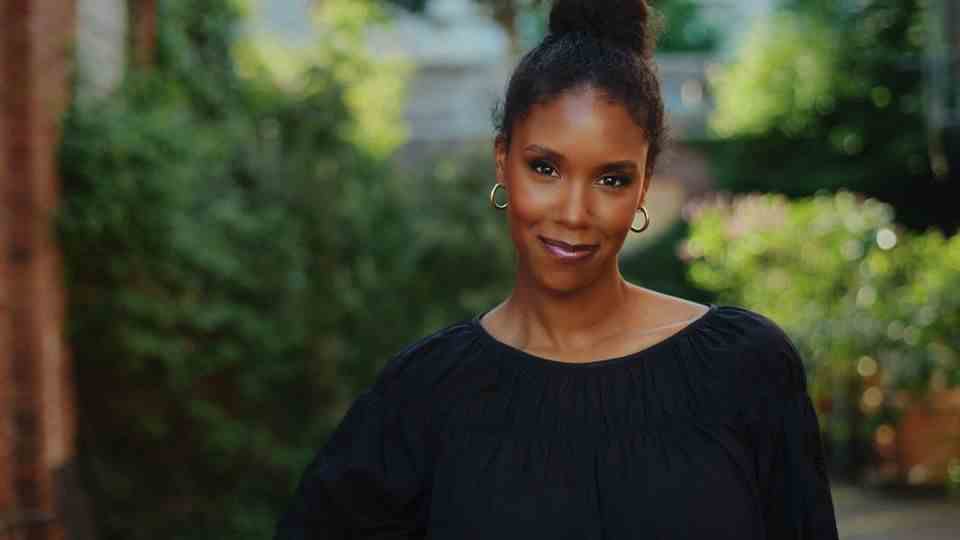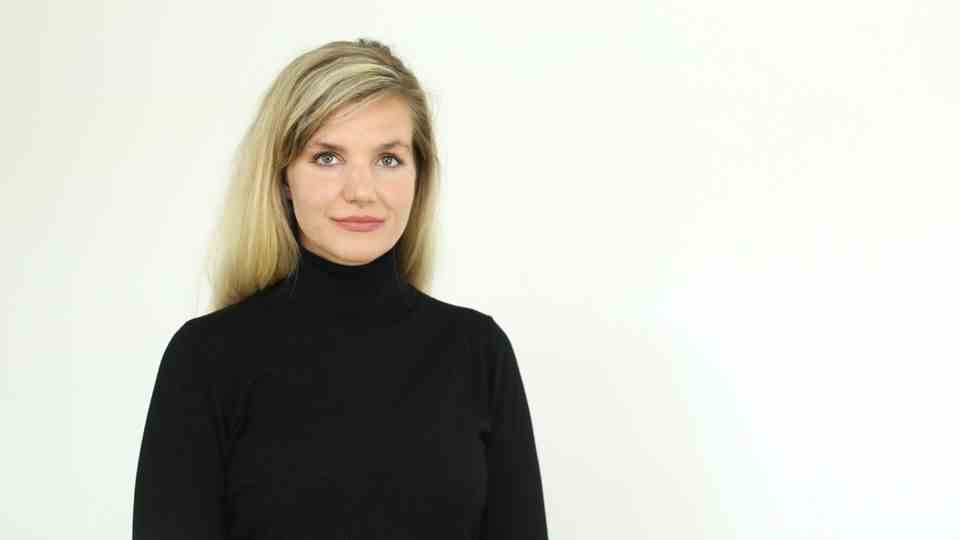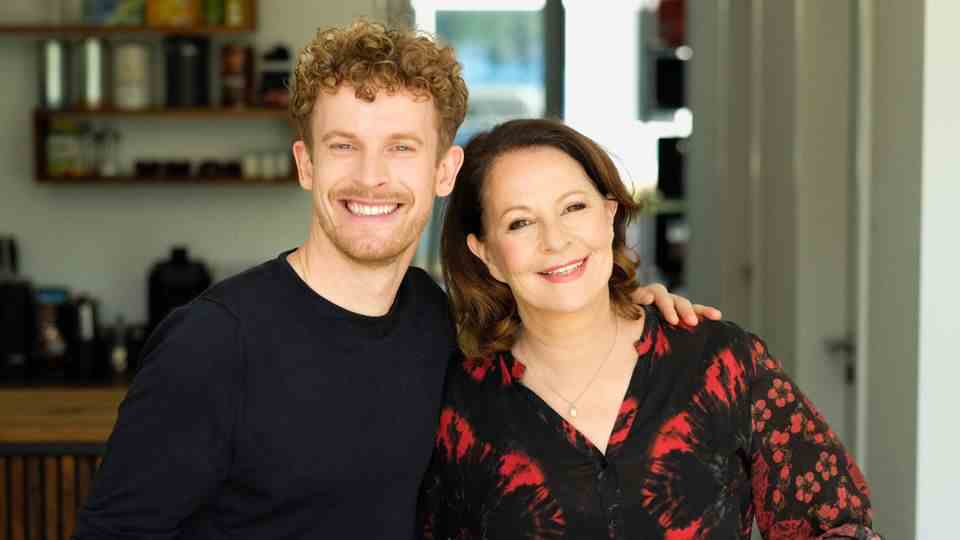The perfect match, the great love – and everything is automatically wonderful. But it’s not that easy. Social inequality also prevails within our couple relationships. How we can work on injustices in our partnerships.
“All you need is love”, whether in a Beatles song, in books or films – love is often touted as the panacea. It is said that love can transcend all borders. Unfortunately, the reality is different. For example, when couples from different countries want to get married and bureaucratic hurdles make this wish a long way off. Or prejudices that gradually suffocate the relationship. Even within relationships, injustice and inequality can separate us. The anti-discrimination trainers: In her book “gap and love” concerned with how discrimination separates couples.

Josephine Apraku is an anti-discrimination trainer. In her book “Kluft und Liebe” she deals with power imbalances within relationships.
© David Buchholz
Even the communication about love picks up many different aspects of discrimination, says Josephine Apraku in an interview with the star. “What we see is mostly white representation, mostly a heterosexual couple who are financially well off. It’s something that strikes me when I think about movies or series. They’re usually people who fit the current beauty norms, like, for example are slim.” We only get to see very specific images of love, this leads to oppression being maintained. “It almost seems like black people or people of color don’t love, like people with disabilities, trans people or non-binary people don’t love.”
Love – what does it mean exactly?
We all grow up with a very specific idea of love – but what does love actually mean? The social psychologist Dr. Johanna Degen deals professionally with love and researches online dating, among other things. What love means for a person is very diverse, the research expert knows. “While we all know the feeling of being in love and we can also prove it neuroscientifically, the feeling of love is understood and expressed differently by people.” Some people express love through touch, for others it means being loyal or honest. In a couple relationship, new norms would have to be negotiated. “We have such an idea of enduring love with a lot of feeling, affection, passion and it’s quite romantically charged. There are few ideas about love in a quieter mode.”
The anti-discrimination trainer: Josephine Apraku adopts the approaches of the psychoanalysts Erich Fromm and M. Scott Peck for her own definition of love. “Love is not just this positive feeling, but above all a decision that we make in the context of our relationship to stand up for the growth of ourselves and that of the other person(s).” Josephine Apraku criticizes that in our society violence is normalized as the last and most expressed form of love. For example, with headlines like “Murder for Passion”. Violence is never a form of love, says Josephine Apraku.
Discrimination in online dating
From an early age we learn who is lovable and who is not. “We are socialized into all forms of oppression,” says Josephine Apraku. The idea of who deserves love shapes the self-image. For example, those who are not portrayed as lovable in films, advertisements or books grow up with a negative self-image. That means believing you have to work harder for love, deserve it less, or be less attractive. This self-perception and oppression also has an impact when looking for a partner.
You might think that online dating and dating apps hold huge potential for meeting people we would never have seen in a bar, at a concert, or in the supermarket, or simply never crossed paths. But research shows that 80 percent of interactions on dating apps are between white people. “We also know from research that black women and men perceived as Asian are the least attractive,” says Josephine Apraku. “If discrimination-relevant aspects such as ‘being fat’ are visible in the pictures in the dating profile, this tends to lead to a person being sorted out.” Johanna Degen also knows from her research: “Online dating is a sphere in which there is strong discrimination. It is most fun for those who are of normal weight, moderately wealthy and who have a symmetrical face.”

Social psychologist Johanna Degen teaches and researches at the European University of Flensburg.
© Kath Konopka
stereotypical dislikes
It’s not easy for those who don’t conform to the norm in the world of online dating. This can lead to a specific strategy: the supposed stigma is brought to the front in the profile in order not to be confronted with a negative reaction when meeting. “One woman told me that she only had her face in her dating pro at first. When they met in real life, her date turned on their heels at the sight of her. She was so hurt that she has since had a full body shot in the app – so she would only date someone who doesn’t mind her corpulent body shape.” The downside: It can lead to fetishization. So you only get dated because of a certain characteristic – like obesity. “But affected people don’t want to be loved just for the trait, nor do they want to be unloved because of it.” Actually, we don’t want to discriminate against other people when dating through our values, says the social psychologist Johanna Degen.
But we all carry stereotypical dislikes and dislikes within us. “The more we are convinced of our own goodness, the more ruthlessly we think and act. The more we admit that we have a distorted view and act discriminatory, we realize it and act more mercifully.” Fear is often behind the derogatory actions of dating. For example, the fear of getting fat and that’s why you devalue people you think are fat.
Whether hatred of fat, racism, hostility towards queer people, trans people or people with disabilities – all these forms of discrimination exist in our society and, according to Josephine Apraku, they are depicted on a small scale in tokens of love. “For example, as a black person, if I were dating a white trans man, we would experience different forms of oppression. While I experience racism, my imaginary partner would experience transphobia. Both are forms of oppression that we can replicate in our relationships.” Josephine Apraku continues: “In a romantic relationship, for example, racist attributions can be made to me. For example, that I’m ‘particularly aggressive’ as a black person.”
Social inequality also affects heterosexual and same-sex relationships differently. Research on conflict found that masculinity was a problem in heterosexual couples, and that straight men were more likely to have difficulty responding to their partner in conflict. In same-sex relationships, on the other hand, it has been observed that the partners are more benevolent towards each other and are more likely to behave in conflicts in a way that allows them to be resolved.
Injustices in couple relationships can be their end
In heterosexual partnerships, inequality often becomes very noticeable when children are born within the relationship: the unequal division of care work, intellectual work and the large number of women who take long parental leave. The mother usually goes on parental leave for 12 months and the father doesn’t at all – that’s true 58 percent of fathers. 42 percent of fathers take two months of parental leave and only 7.6 percent spend more than ten months looking after their children instead of their careers. In contrast, 95.4 percent of women take parental leave for more than ten months. An individual decision? “Given the mass of these decisions that occur, it only makes sense to look at it structurally, and we already know from research that it’s a structural problem,” says Johanna Degen. Anti-discrimination trainer: Josephine Apraku explains that in this context it is often a financial decision: “Women are paid less on average, so the sexist discrimination at work extends into the love relationship.”
But for our partnerships, there are ways to recognize and work on the inequalities within the relationship. “It is important that we understand how discrimination works, what forms it takes and that we acquire knowledge about it,” says Josephine Apraku. Couples should look at the oppression in their relationship and talk about it. An example: Couples can regularly check whether the care work is distributed appropriately.
To take a look at whether a person is doing significantly more and what form of oppression this is linked to. And think together about what kind of balance can be created here. And anyone who has an interest in their own relationship should also have an interest in eliminating the injustices within the partnership. “A look at the research reveals that too much injustice leads to our relationships breaking down,” says Josephine Apraku.
This article contains so-called affiliate links. There is more information here.


